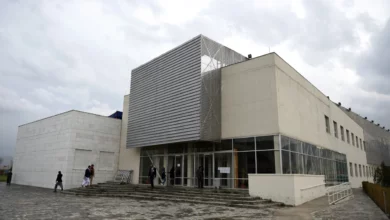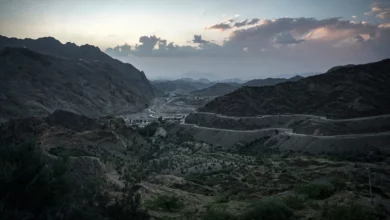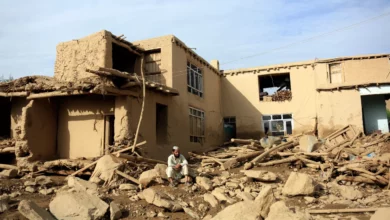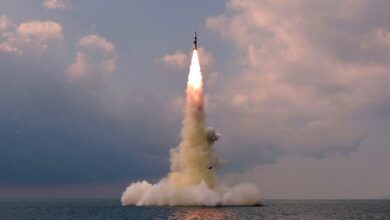Marjah, Afghanistan– Squads of US Marines and Afghan soldiers slowly pressed deeper into the Taliban stronghold of Marjah on Sunday, painstakingly clearing out booby-trapped houses one by one.
Homemade bombs and mines slowed the advance of thousands of US, British and Afghan soldiers in NATO’s most ambitious effort yet to break the militants’ grip over their southern heartland.
Using metal detectors and sniffer dogs, US forces found caches of explosives rigged to blow as they went from compound to compound. They also discovered several sniper positions, freshly abandoned and booby-trapped with grenades.
NATO said it hoped to secure Marjah, the largest town under Taliban control and a key opium smuggling hub, within days, set up a local government and rush in development aid in a first test of the new US strategy for turning the tide of the eight-year war. The offensive is the largest since the 2001 US-led invasion of Afghanistan.
At least two shuras, or meetings, have been held with local Afghan residents–one in the northern district of Nad Ali and the other in Marjah itself, NATO said in a statement. Discussions have been "good," and more shuras are planned in coming days as part of a larger strategy to enlist community support for the NATO mission.
Afghan officials said Sunday that at least 27 insurgents had been killed in the operation. Helmand government spokesman Daoud Ahmadi said troops found a large cache of bomb-making materials in one compound in Marjah.
Most of the Taliban appeared to have scattered in the face of overwhelming force, possibly waiting to regroup and stage attacks later to foil the alliance’s plan to stabilize the area and expand Afghan government control in the volatile south.
Two NATO soldiers were killed on the first day of the operation–one American and one Briton, according to military officials in their countries.
More than 30 transport helicopters ferried troops into the heart of Marjah before dawn Saturday, while British, Afghan and US troops fanned out across the Nad Ali district to the north of the mud-brick town, long a stronghold of the Taliban.
Major General Gordon Messenger told reporters in London that British forces "have successfully secured the area militarily" with only sporadic resistance from Taliban forces. A Taliban spokesman insisted their fighters still controlled the town.
President Barack Obama was keeping a close watch on combat operations, White House spokesman Tommy Vietor said.
The president will get an update from his national security adviser, General Jim Jones, later Saturday. Vietor said Defense Secretary Robert Gates will also have the top US commander in Afghanistan, General Stanley McChrystal, brief Obama on Sunday morning.
In Marjah, Marines and Afghan troops faced little armed resistance. But their advance through the town was impeded by countless land mines, homemade bombs and booby-traps littering the area. Marine ordnance teams blew up several dozen bombs, setting off huge explosions that reverberated through the dusty streets.
On Sunday, most of the Marines said they would have preferred a straight-up gunbattle to the "death at every corner" crawl they faced, though they continued to advance slowly through the town.
"Basically, if you hear the boom, it’s good. It means you’re still alive after the thing goes off," said Lance Corporal Justin Hennes, 22, of Lakeland, Florida.
Local Marjah residents crept out from hiding after dawn Sunday, some reaching out to Afghan troops partnered with Marine platoons.
"Could you please take the mines out?" Mohammad Kazeem, a local pharmacist, asked the Marines through an interpreter. The entrance up to his shop had been completely booby-trapped, without any way for him to re-enter his home, he said.
The bridge over the canal into Marjah from the north was rigged with so many explosives that Marines erected temporary bridges to cross into the town.
"It’s just got to be a very slow and deliberate process," said Captain Joshua Winfrey of Stillwater, Oklahoma, a Marine company commander.
Lieutenant Colonel Brian Christmas, commander of the 3rd Battalion, 6th Marines, said US troops fought gunbattles in at least four areas of the town and faced "some intense fighting."
To the east, the battalion’s Kilo Company was inserted into the town by helicopter without meeting resistance but was then "significantly engaged" as the Marines fanned out from the landing zone, Christmas said.
Marine commanders had said they expected between 400 and 1000 insurgents–including more than 100 foreign fighters–to be holed up in Marjah, a town of 80,000 people that is the linchpin of the militants’ logistical and opium-smuggling network in the south.
The offensive, code-named "Moshtarak," or "Together," was described as the biggest joint operation of the Afghan war, with 15,000 troops involved, including some 7500 in Marjah itself. The government says Afghan soldiers make up at least half of the offensive’s force.
Once Marjah is secured, NATO hopes to quickly deliver aid and provide public services in a bid to win support among the estimated 125,000 people who live in the town and surrounding villages. The Afghans’ ability to restore those services is crucial to the success of the operation and in preventing the Taliban from returning.




